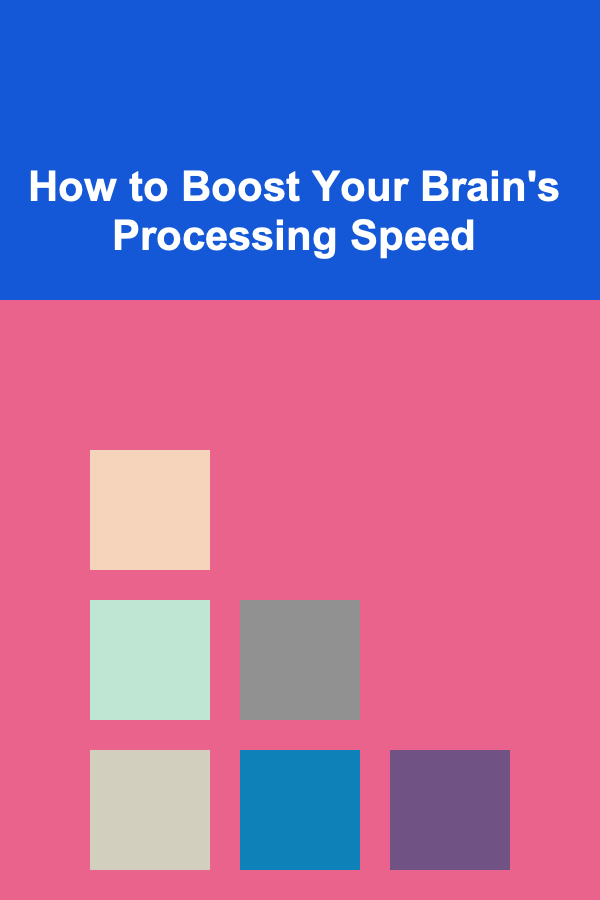
How to Boost Your Brain's Processing Speed
ebook include PDF & Audio bundle (Micro Guide)
$12.99$11.99
Limited Time Offer! Order within the next:

The brain is an incredibly complex organ, capable of performing millions of tasks simultaneously, from regulating bodily functions to solving complex problems. While some of its processes, like memory storage and emotional responses, are automatic, others, such as thinking, decision-making, and reasoning, require conscious effort. The speed at which your brain can process information plays a crucial role in the efficiency of these tasks. But can we enhance this processing speed? The good news is that, through a combination of lifestyle changes, mental exercises, and proper care, you can boost your brain's processing speed and cognitive performance. In this article, we'll explore the science behind brain processing speed and provide practical tips to enhance it.
Understanding Brain Processing Speed
Before diving into ways to improve brain processing speed, it's important to understand what it is. Brain processing speed refers to how quickly your brain can receive, interpret, and respond to information. It involves multiple aspects of cognition, such as perception, memory, and attention. The faster the brain processes information, the more efficiently it can handle various tasks. This is crucial in activities that require quick thinking and multitasking.
In scientific terms, processing speed can be described in terms of reaction time, working memory capacity, and cognitive flexibility. Reaction time is how quickly you can respond to stimuli, working memory refers to the temporary storage and manipulation of information, and cognitive flexibility is the ability to switch between different tasks or thoughts seamlessly.
Some individuals naturally have faster brain processing speeds than others, due to genetic factors. However, there are numerous ways to improve this ability, and the following strategies can help boost brain speed in everyone.
Regular Physical Exercise
One of the most effective ways to boost brain processing speed is through regular physical exercise. Exercise has been shown to have a profound impact on brain function, particularly in enhancing cognitive speed, focus, and memory.
The Science Behind Exercise and Brain Speed
Physical activity increases blood flow to the brain, delivering oxygen and essential nutrients that promote brain health. This process also stimulates the production of brain-derived neurotrophic factor (BDNF), a protein that plays a critical role in learning and memory. Exercise, especially aerobic activities like running, cycling, and swimming, also triggers the release of neurotransmitters such as dopamine and serotonin, which are important for mood regulation and cognitive function.
How Exercise Boosts Brain Speed
- Increased Blood Flow: More blood flow means more oxygen and nutrients to brain cells, enhancing their efficiency.
- Neurogenesis: Physical exercise stimulates the creation of new neurons, particularly in the hippocampus, which is involved in memory and learning.
- Improved Neuroplasticity: Exercise enhances the brain's ability to form new neural connections, making it easier to adapt to new information.
Recommended Exercise Routines
To experience the brain-boosting benefits of exercise, aim for at least 30 minutes of moderate-intensity exercise, like brisk walking or cycling, five times a week. For additional benefits, incorporate strength training or high-intensity interval training (HIIT), which can stimulate more significant changes in the brain.
Mental Stimulation and Cognitive Training
Just as physical exercise strengthens muscles, mental exercise strengthens the brain. Engaging in challenging cognitive tasks regularly can improve brain processing speed by strengthening neural connections and promoting the growth of new ones. Mental stimulation helps enhance neuroplasticity, which is the brain's ability to reorganize itself by forming new connections.
Cognitive Training Exercises
There are numerous cognitive exercises and mental challenges that can boost processing speed. These exercises include activities like:
- Puzzle-solving: Activities such as Sudoku, crossword puzzles, or brainteasers challenge your brain and improve critical thinking and problem-solving abilities.
- Memory games: Apps and games designed to improve memory, such as the classic "memory matching" games, can help improve working memory and reaction time.
- Learning a new language: Bilingualism or learning a new language has been shown to increase processing speed, enhance multitasking abilities, and improve executive functions, such as decision-making.
- Mindfulness and meditation: These practices can enhance focus, attention, and working memory, all of which are essential for improving processing speed.
How Cognitive Training Works
- Memory Improvement: Engaging the brain in memory exercises strengthens your working memory, which, in turn, improves your ability to process and retain information.
- Increased Processing Speed: Complex mental challenges, like solving puzzles or learning new skills, require your brain to work faster and more efficiently, improving overall processing speed.
- Boosted Executive Functions: Mental tasks that require decision-making, problem-solving, and planning can help improve cognitive flexibility and mental agility.
Popular Cognitive Training Programs
Programs like Lumosity, CogniFit, and Peak offer a variety of games designed to enhance brain speed, memory, and focus. You can use them daily for consistent improvement.
Nutrition for Brain Health
What you eat has a direct impact on your brain's ability to process information. Consuming a diet rich in nutrients can improve cognitive function, support neural health, and enhance memory and speed of thought. Certain nutrients, such as omega-3 fatty acids, antioxidants, and vitamins, are particularly important for brain health.
Key Nutrients for Boosting Brain Speed
- Omega-3 Fatty Acids: Found in fatty fish, flaxseeds, and walnuts, omega-3s are crucial for maintaining brain structure and function. They are linked to improved memory and processing speed.
- Antioxidants: Blueberries, leafy greens, and other colorful fruits and vegetables are rich in antioxidants, which protect the brain from oxidative stress and inflammation that can slow down processing speed.
- B Vitamins: B vitamins, including B6, B12, and folic acid, play a vital role in brain health. They help maintain nerve cell function and improve memory and cognitive speed.
- Magnesium: Magnesium helps regulate neurotransmitter function and supports memory and learning. Sources include leafy greens, nuts, and seeds.
Tips for Brain-Boosting Nutrition
- Eat more fish: Incorporate omega-3-rich fish like salmon, mackerel, and sardines into your diet.
- Snack on nuts: Nuts and seeds are great sources of healthy fats, protein, and magnesium.
- Add leafy greens: Vegetables like spinach, kale, and broccoli are packed with essential nutrients and antioxidants.
- Drink green tea: Green tea contains L-theanine and caffeine, both of which have been shown to improve focus and brain speed.
Adequate Sleep and Rest
Sleep plays an essential role in cognitive function. During sleep, the brain consolidates memories, removes toxins, and restores energy to cells. Lack of sleep can significantly impair cognitive processing speed, making it harder to think clearly, make decisions, or remember information.
How Sleep Affects Brain Processing Speed
- Memory Consolidation: Sleep helps solidify new information learned during the day, making it easier to retrieve and process later.
- Brain Detoxification: During deep sleep, the brain activates the glymphatic system, which removes waste products that can slow down brain function.
- Cognitive Recovery: Sleep restores energy to neurons, improving their ability to function efficiently during waking hours.
Tips for Improving Sleep Quality
- Maintain a Sleep Schedule: Go to bed and wake up at the same time every day to regulate your circadian rhythm.
- Create a Sleep-Friendly Environment: Keep your bedroom cool, dark, and quiet. Avoid screens (phones, computers) before bedtime.
- Avoid Stimulants: Limit caffeine and alcohol intake, particularly in the evening, as they can interfere with sleep quality.
Stress Management
Chronic stress can have detrimental effects on brain function. When stressed, the body releases cortisol, a hormone that, in high levels, can impair memory and slow down processing speed. Managing stress through relaxation techniques can help improve cognitive performance and processing speed.
Stress Reduction Techniques
- Meditation: Mindfulness meditation has been shown to reduce stress, enhance focus, and improve working memory.
- Deep Breathing: Techniques like deep breathing or progressive muscle relaxation can lower cortisol levels and improve brain function.
- Yoga: Yoga combines physical movement with breathing exercises and mindfulness, making it an excellent tool for reducing stress and boosting brain performance.
How Stress Management Helps Brain Speed
- Lowered Cortisol Levels: Reducing stress helps decrease cortisol, protecting the brain from cognitive decline.
- Improved Focus: Meditation and mindfulness exercises improve attention and concentration, which directly impact processing speed.
- Enhanced Memory: Lower stress levels improve both short-term and long-term memory, leading to faster and more accurate processing of information.
Staying Socially Active
Social interactions are more than just enjoyable---they also provide cognitive benefits. Engaging in meaningful conversations and social activities requires your brain to process information quickly, think critically, and maintain attention. Studies have shown that staying socially active can improve cognitive function and processing speed, particularly in older adults.
Benefits of Socializing on Brain Processing Speed
- Increased Cognitive Engagement: Engaging in conversations and social interactions challenges your brain to process information quickly.
- Improved Emotional Well-being: Socializing reduces feelings of loneliness and depression, which can improve overall brain function.
- Cognitive Reserve: Regular social interactions can build cognitive reserve, which helps protect against age-related cognitive decline.
Tips for Staying Socially Active
- Join clubs or groups: Participate in group activities or join clubs that match your interests to keep your brain engaged.
- Engage in stimulating conversations: Talk with friends and family about complex topics that require thoughtful discussion and reflection.
- Volunteer: Volunteering for social causes not only helps others but also provides opportunities to engage in cognitive and emotional growth.
Conclusion
Boosting brain processing speed is not a one-time event but rather a lifelong endeavor. By adopting a combination of physical exercise, mental stimulation, proper nutrition, quality sleep, stress management, and social engagement, you can enhance your brain's ability to process information more quickly and efficiently. Like any other part of your body, your brain thrives when you take good care of it. The journey to improving cognitive speed requires consistent effort and attention, but the rewards---sharper thinking, quicker decision-making, and better memory---are well worth it. So, start incorporating these strategies today and watch your brain's processing speed soar.

Designing Success: Essential Skills for the Modern Graphic Designer
Read More
How to Decorate with Holiday-Themed Throw Pillows
Read More
How to DIY Simple Repairs Around the House
Read More
How to Take Care of Your Home's Outdoor Lighting
Read More
How to Use Open Shelving to Save Space and Stay Organized
Read More
Straightening Disc Rotors with a Rotor Truing Fork: A Comprehensive Guide
Read MoreOther Products

Designing Success: Essential Skills for the Modern Graphic Designer
Read More
How to Decorate with Holiday-Themed Throw Pillows
Read More
How to DIY Simple Repairs Around the House
Read More
How to Take Care of Your Home's Outdoor Lighting
Read More
How to Use Open Shelving to Save Space and Stay Organized
Read More